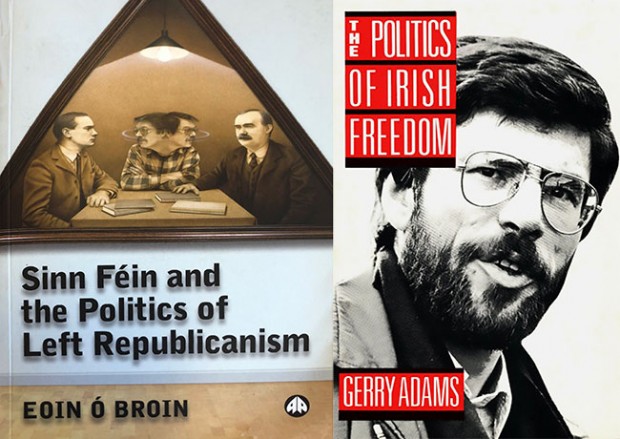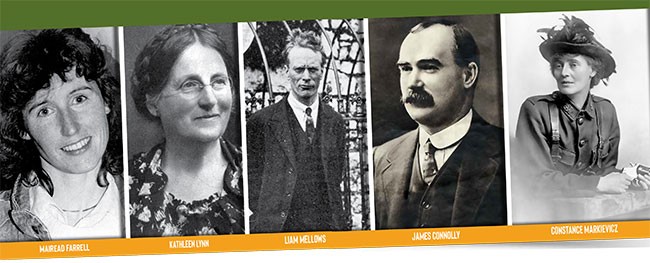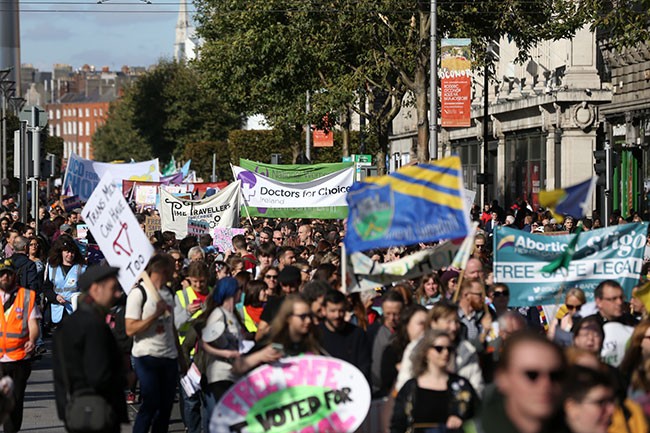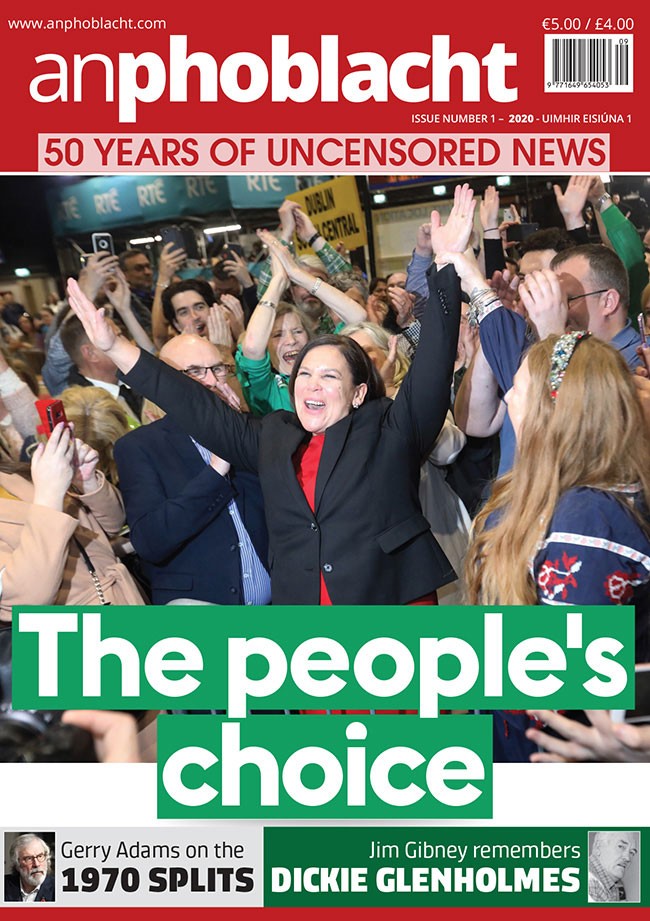28 May 2020 Edition
Republican political ideas vital in this age of change

Sinn Féin is now the most popular political party in Ireland and the voice of the discontented working class of this country. We are the biggest threat to the conservative establishment that has controlled the 26-County State for a century. As such, the party has a responsibility to provide ideological guidance to our activists and wider support base.
In his 2009 book, 'Sinn Féin and the Politics of Left Republicanism', Eoin Ó Broin explored the history of our movement and critically examined the failures of past struggles and the shortcomings of our ideology. This was one of the first books by a proponent of Irish republicanism to critically examine the historical development of left republicanism and attempted to put forward a theory of the ideology since Gerry Adams wrote 'The Politics of Irish Freedom' in 1986.
Ó Broin’s book is a challenging one that dispels some of the myths surrounding Irish republicanism – both by its supporters as well as its opponents – and is one that deserves to be revisited today.
One of Ó Broin’s key observations was that left republicanism has been “confused and under-theorised”. He wrote: “Despite having a significant body of political writings left by Connolly, twentieth century republicans, in contrast with socialist and communist movements across Europe, by and large avoided ideological discussion or critique.”
Indeed, it is notable that no other major book by a proponent of Irish republicanism has been published examining the theory of our ideology since Eoin Ó Broin’s over a decade ago. Since then, we have experienced the EU/IMF bailout, harsh austerity, Brexit, the skyrocketing cost of living, the vandalism of our health service, the collapse and restoration of the institutions in the 6 Counties and, most recently, Covid-19.
While it may seem to be a mere exercise in academia, this failure to properly devote time and energy into developing a coherent political theory has real world consequences. Without ideological theory and the popular political education that should come with it, we are vulnerable to being caught out by unpredicted events. Theory helps guide our action. As Lenin stated in his famous pamphlet, What Is To Be Done?: “Without revolutionary theory, there can be no revolutionary movement”.
Component parts of Irish Republicanism
The brand of republicanism that Sinn Féin advocates is firmly on the left. In my view, there are five basic components of modern left republicanism: national sovereignty, socialism, feminism, internationalism and anti-racism.
National Sovereignty
The first component part, national sovereignty, is an obvious one for Irish republicans. The idea of national sovereignty holds that the people of any given country have the right to determine their own affairs, free from the interference of more powerful States. This right is one that has been denied to Ireland through centuries of occupation and partition.
In recent years, national sovereignty is a concept that has resonated among many people dissatisfied with establishment politics. Unfortunately, as seen with the election of Donald Trump, much of the rhetoric surrounding Brexit and the rise of fascist parties across Europe, this ground has been monopolised by the populist right. However, as William Mitchel and Thomas Fazi point out in their 2018 book, Reclaiming the State, the left need to reassert the value in using the nation state to bring about progressive change and not concede this ground to the far right. Given our history of anti-imperialist struggle and exerting Ireland’s right to self-determination, Sinn Féin is in a unique position to do this.
Our commitment to national sovereignty determines how we act politically. It is obvious British rule in the North is anti-democratic and violates our right to national sovereignty. However, in the present era, our commitment to national sovereignty should pose a series of questions regarding the nature of our relationship with the European Union. Can we be truly sovereign if we don’t even have our own currency? How much independence would we really have in a United Ireland if we are forced to make our economic decisions based on the EU’s fanatical devotion to neoliberal dogma? Are we really independent if the EU prohibits Keynesian economics, let alone socialism? And is there a realistic strategy by the European left, of which we are part, to reform the EU from within?

Socialism
The second strand of modern Irish republicanism should incorporate socialism, the idea that working people should have maximum control over their workplaces and the economy is planned according to human need rather than profit.
As Gerry Adams once said: “In Ireland until partition is got rid of and a United Ireland established, being genuinely left-wing is to be an out-and-out republican. This was the key lesson of James Connolly for socialists in Ireland. That is why he was led, as a socialist, to join Pearse and the other radical republicans and democrats in a fight to establish an Irish Republic. If that fight had been successful, Connolly and the socialists would then have been in the best position to advocate the economic and social changes which constitute socialism. They would have proved themselves by their leadership of the independence struggle. That is why it is a political mistake to counterpoise republicanism and socialism in Ireland as if they were opposites or antagonistic”
Socialism has always been an important strand of Sinn Féin’s politics but, as Eoin Ó Broin pointed out, “The party’s socialism has been ambiguous, underdeveloped and at times contradictory”. He was also right to suggest that many republicans invoked socialism only in so far as it benefited the struggle for national independence rather than being an aim in itself.
The socialism of Liam Mellows, as Ó Broin points out, “did not come from an understanding of the relationship between capitalism and Empire, from readings of socialist literature or involvement in working-class struggle, but from the disappointment at the outcome of the Anglo-Irish Treaty. What became clear to Mellows, while in jail, was that when the independence movement split, it split as much on class lines as anything else. His response was to encourage the mobilisation of the country’s dispossessed to the cause of the republic. For Mellows, socialism was a means to an end, namely nationalist revolution.”
It’s important to point out that socialism is not about taxing the rich and redistributing wealth, as welcome as that is. It is about the democratic ownership and control of major industry and wealth. It is about democracy in the workplace, not just having elections every five years. It is about making investment decisions in a democratic way and focused on meeting human needs rather than seeking profit for private individuals. In the era of climate breakdown, the deterioration of working conditions and rising fascist movements across the world, we can no longer afford a hierarchy of aims. The struggle for national liberation needs to be a struggle against capitalism.

Sinn Féin played a significant role in the referendum to repeal the 8th amendment - but do we still need to question our relationship with feminism and questions of gender?
Feminism
It is difficult not to draw similarities in both women’s struggle for equality and freedom and our demands for national sovereignty. Republican women have always seen the two as intertwined. As Mairéad Farrell said: “I am oppressed as a woman but I am also oppressed because I’m Irish. Everyone in this country is oppressed and we can’t successfully end our oppression as women until we first end the oppression of our country.”
Many of the Irish suffragettes are familiar names in republican iconography through their involvement in Cumann na mBan and the Irish Citizen Army, such as Kathleen Lynn and Constance Markievicz. Women’s organisations were always among the more radical sections of our movement, and it is no surprise that every single female TD in the Second Dáil voted against the Treaty in 1922, foreseeing the reactionary and counter-revolutionary State that would arise from it. They were unfortunately proven right when women became the most marginalised and oppressed section of our people under the Free State.
Of all the republican formations, the modern Sinn Féin has arguably been the strongest on women’s rights. Although we were slow to address the question of abortion and triangulated on the issue for years, we played a significant role in winning the referendum to repeal the eighth amendment. We need to acknowledge our movement’s problematic relationship with feminism and questions of gender. As Ó Broin observed, women’s roles were “clearly marginal” in movements like the Young Irelanders and the United Irishmen, while Fenian journals “The Nation and The United Irishman appear silent on the question of women’s rights”.
It also needs to be acknowledged that the failure to fully embrace the struggle for women’s emancipation empowered the bourgeois reactionaries within the national movement such as Kevin O’Higgins and William T. Cosgrave who would later spearhead the counter-revolution. Indeed, P.S. O’Hegarty, a leading ideologue for the Free State regime, complained that the revolutionary period “encouraged women to forget their sex and play at gunmen”.
More recently, in the aftermath of the 2019 European and local elections, some members opined that Sinn Féin’s poor performance was due to the party being too vocal about reproductive rights. Even if it was true (which it absolutely is not), we should not be subjugating human rights to short-term electoral success. It is more important to stand up for human rights such as abortion access particularly when it is not popular. It is obvious that some republicans on some level still see women’s liberation as an optional add on, rather than an intrinsic part of our struggle, and is something that needs to be faced up to.
On a broader level, women’s work – both in the workplace and in the home – is vastly undervalued. The Coronavirus pandemic has shown us which jobs are actually important in society. It’s not the advertisers, the stockbrokers, the entrepreneurs, the tax lawyers or those running the insurance cartels. All these jobs are highly paid yet, as the lockdown has shown, all are either completely socially useless or actively harmful to the rest of us. The jobs we actually rely on – the shop assistants, the care assistants, the nurses – are all under-paid and mostly done by women.
In addition, the capitalist system we live under refuses to account for the countless hours of labour – again, mostly done by women – in the domestic sphere: child minding, child rearing, cooking, washing, helping kids with homework, care for elderly and sick relatives; None of these vital activities are counted as part of GDP. None of it is paid, despite the fact that the entire global economy relies on this social reproduction for its very survival. This is something that Sinn Féin – and the global left for that matter – needs to recognise. As the great communist revolutionary and feminist Alexandra Kollontai said: “Capitalism has placed a crushing burden on the shoulders of working women; it makes her a wage worker, but does not lessen her duties at home as a mother and as a housekeeper.”
Too often women’s issues are relegated to matters of identity and Clintonite symbolism of “breaking the glass ceiling” which seeks to increase female representation in corporate boards and imperialist armies. Advancing the cause of feminism means confronting the injustice that disproportionately affect women, but also affect working class men: low pay, anti-trade union employers, rip-off rents and the vandalism of our public health system.

Sinn Féin is now the most popular political party in Ireland
Internationalism
Every Irish republican struggle has occurred in the context of wider global upheavals and struggles. The United Irishmen were inspired by revolutions in France and America. In the 19th Century, Fenians such as James Stephens and John Devoy were involved in the International Workingmen’s Association, which famously boasted Karl Marx as a leading member. Indeed, the 1917 Bolshevik Revolution inspired many involved in our own revolution at the time. Thousands attended an event in the Mansion House in Dublin celebrating the victory of Lenin’s Bolsheviks.
In 1916, the Easter Rising happened in the context of the First World War. James Connolly was one of the few socialist leaders in the world to oppose the war, declaring it “War for which all the jingoes are howling, war to which all the hopes of the world are being sacrificed, war to which a mad ruling class would plunge a mad world”.
More recently, the armed struggle against British rule in the Six Counties was part of a global anti-colonial struggle that saw insurrections in Palestine, South Africa, Vietnam, Angola and many other oppressed nations. Our struggle has always been international in character.
Anti-racism
Because of our history of being a colonised and oppressed nation, Ireland is unique in Europe in that our nationalism is not synonymous with white supremacy and immigrant baiting.
Sinn Féin deserves significant credit in ensuring that the organised far-right have never been able to get a foothold in Ireland. We have channeled discontented working-class nationalism in a progressive and anti-imperialist direction, and have denied fascists the political ground on which they can grow. Unlike most other parties of the centre-left in Europe, Sinn Féin have never capitulated to racism or anti-immigrant sentiment.
In countries where the centre left tried to placate racism by appearing “tough on immigration”, this approach served only to legitimise their arguments of the far right and their support subsequently grew. Sinn Féin has proven that sticking to an uncompromising anti-racist position is the correct one both morally and strategically.
Political education, popular power and social change
A key objective of our party is to popularise republicanism, and an important way of doing this is through political education, not only of our activists, but our wider support base in our communities and workplaces. Sinn Féin began doing this with the series of public rallies that took place after the election but were cut short as a result of the lockdown. When the lockdown is lifted, this is the type of political activity Sinn Féin should pursue. We need to invoke the tradition of the United Irishmen who sought to “make everyman a politician”. We need to popularise political and economic ideas and give people ownership of the struggle against Fine Gael and Fianna Fáil.
We need to remind people that politics is not just what happens in Leinster House, but also takes place in every community, household and workplace. We have to remind people that collectively they have the power, through strikes, street demonstrations and community organising, to challenge the right-wing establishment that have decimated our living conditions and public services.
A conversation about what it means to be an Irish republican in the 21st Century is essential. We need to ensure that the development of our ideology is carried out in direct dialogue with our members, who can bring their lived experiences to the discussion, which in turn will ensure that our ideology remains not only radical, but relevant to the lives of ordinary people.
Ruairí Creaney is the Sinn Féin organiser for Kildare and a founding member of Trade Unionists for a United Ireland.



